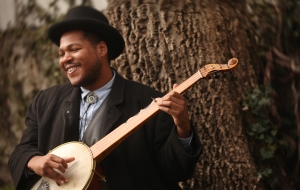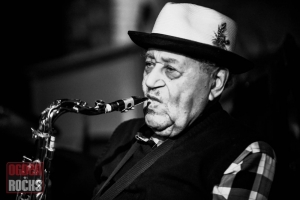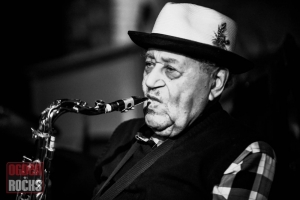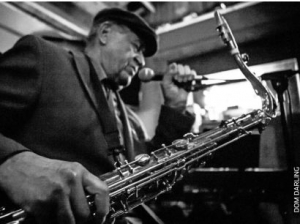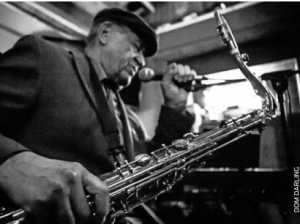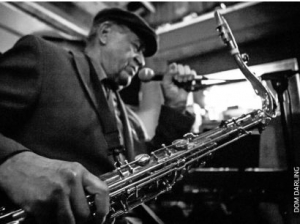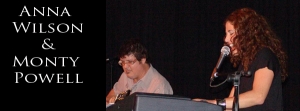Displaying items by tag: jazz
Jerron "Blind Boy" Paxton
"At first glance, everything about Jerron Paxton looks and feels like a journey back in time to the early days of roots music, blues, and American folk. His effortless juggling of instruments — from harmonica to fretless banjo, to guitar, to fiddle — his humorous banter, his rustic stage wear, even his on-stage moniker, “Blind Boy” Paxton, all conjure past musical eras. The songs and stories Paxton presents don’t come from dusty songbooks, obscure recordings, or forgotten archives, though. They were each a part of the soundtrack of his childhood growing up in South Central Los Angeles. In an area most famous for hip hop and R&B, a vibrant musical tradition flourished, starting from the deep southern U.S. and traveling along Interstate-10 all the way to L.A.
Paxton’s connection to these songs — to these nuggets of American, African-American, and working-class cultures — shines through his performances and recordings. He is not merely a preservationist mining bygone decades for esoteric material or works that fit a certain aesthetic or brand. He simply takes music that is significant to his identity, his culture, and his experience and showcases it for a broader audience. Its value does not reside solely in its history or in the authentic replication of that history, but also exists in its present, its relevance to modern times, and its future, as well." - Bluegrass Situation
Paxton's style draws from blues and jazz music before World War II and was influenced by Fats Waller and "Blind" Lemon Jefferson. According to Will Friedwald in The Wall Street Journal, Paxton is "virtually the only music-maker of his generation — playing guitar, banjo, piano and violin, among other implements — to fully assimilate the blues idiom of the 1920s and '30s, the blues of Bessie Smith and Lonnie Johnson."
Originally from the Watts district of Los Angeles, Paxton's grandparents moved from Louisiana to California in 1956.These southern roots would have an influence on Paxton as a young boy. After spending time listening to his hometown blues radio station, as well as the old Cajun and country blues songs his grandmother used to sing, Paxton became interested in these early sounds, developing a breadth of knowledge pertaining to such music along the way. He began playing the fiddle when he was twelve, only to pick up the banjo two years later. As a teenager, he began to go blind, losing most of his eyesight by the age of 16. Since his childhood, he has added piano, harmonica, Cajun accordion, ukulele, guitar, and the bones to his musical arsenal, although the banjo was his first serious instrument. In addition to blues and jazz, he uses these instruments to play ragtime, country blues, and Cajun music.
Paxton's talent and contributions to acoustic blues have earned him comparisons to contemporary artists such as Taj Mahal, Keb' Mo', and Corey Harris. Similar to groups such as the Carolina Chocolate Drops, he is one of the few contemporary African-American banjo players touring today.
The Joe McQueen Quartet
Sunday 1:30pm
Recipient of OFOAM's Don Baker Award in 2014 and permanent fixture at the Ogden Valley Roots and Blues Festival, Joe McQueen is a legend among Jazz enthusiasts and the Ogden crowd.
Joe McQueen
Sunday 1:30pm
Recipient of OFOAM's Don Baker Award in 2014 and permanent fixture at the Ogden Valley Roots and Blues Festival, Joe McQueen is a legend among Jazz enthusiasts and the Ogden crowd.
Joe McQueen
Joe McQueen is a legend among Jazz enthusiasts and the Ogden crowd. Making his way through Ogden in 1945 he was stranded and has pretty much stuck around ever since. Unpretentious and honest in his musicmanship, Joe plays from the heart and strives to share his soul through the wail of his saxophone.
Joe McQueen - OFOAM Don Baker Award 2014
Joe McQueen
Joe McQueen is a legend among Jazz enthusiasts and the Ogden crowd. Making his way through Ogden in 1945 he was stranded and has pretty much stuck around ever since. Unpretentious and honest in his musicmanship, Joe plays from the heart and strives to share his soul through the wail of his saxophone.
During his life, McQueen has performed in Ogden with jazz luminaries such as Charlie Parker, Chet Baker, Paul Gonsalves, Lester Young, Count Basie, Duke Ellington, Dizzy Gillespie, and others. McQueen has toured as a musician in the Rocky Mountain West. He played in 1962 in Idaho Falls, Idaho with Hoagy Carmichael.
During his early years in Ogden, McQueen worked and played at the Porters and Waiters Club in Ogden. This was one of the few venues open to black Americans at the time. McQueen was the first African-American in Utah to play at previously white-only establishments and to have a mixed-race band.
At the age of 94, McQueen continues to perform live in clubs from Ogden to Salt Lake, record, and was recently the subject of a documentary film: "King of O-Town."
Red Rock Hot Club
The Red Rock Hot Club is recognized as one of the top American Gypsy Jazz Ensembles. Founded in 1999, and led by the swinging guitar styling’s of Rich D’aigle, the group specializes in Gypsy Jazz; a European take of an American Art form. With the added help of Pat and Scott Terry, on guitar and bass, the core of the hot club delivers the sound of Paris (ala 1937), spot on, all the while making it fun and informative.
Anna Wilson & Monty Powell
Anna Wilson's revolutionary new album, Countrypolitan Duets, creates a magical union of country, jazz and pop by effortlessly blending the genres to form a fresh but timeless new sound that pays homage to Nashville's musical roots.
"I would describe it as country music and jazz music shaking hands because it's a real fusion of two great American musical art forms," Anna says. But that modest description is an understatement, according to noted author/music historian Robert K. Oermann, who says, "Top vocalist Anna Wilson has made the first album that fully marries jazz to country music... Anna Wilson is not just 'shaking hands' with two Nashville traditions. She is embracing them both. Brilliantly."

